Midwives deliver - on World Refugee Day and every day
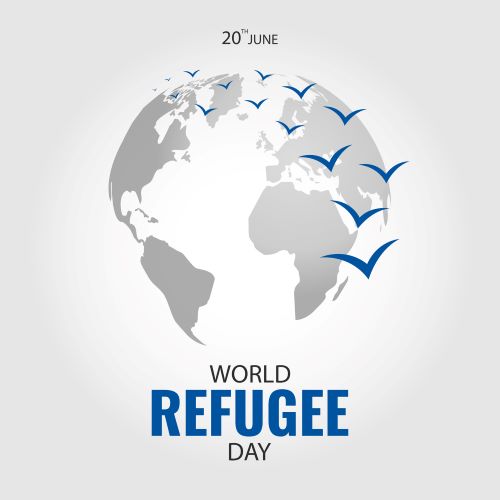
June 15, 2022
Monday, June 20, is World Refugee Day, a date designated by the United Nations to honour the courage and strength of people who have fled their home country to escape persecution or conflict. The date presents an opportunity to foster empathy for the challenges faced by refugees around the world and to acknowledge the resilience required to rebuild their lives.
Midwives are well positioned to provide community-based, primary care for pregnancy, birth and postpartum to refugee clients. Midwifery care is free for anyone residing in Ontario, regardless of immigration status. Midwives often act as the bridge connecting newcomers and their families to other health-care services above and beyond the scope of midwifery care.
Many midwives, midwifery practice groups and expanded midwifery care models hold spots and dedicate resources specifically for clients who are late to care or new to the country, including refugees and asylum seekers. In honour of World Refugee Day, the AOM spoke to five midwives who devote a significant amount of their time and work to providing supports and services to refugee populations in their communities.
Khadija Boulaftali, RM (she/her)
Ottawa South Midwives [Ottawa]
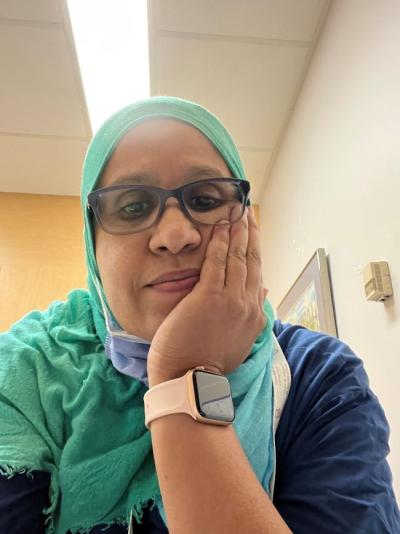
"I speak English, French, and Arabic. My clients are mainly Arabic speakers, Syrian refugees and Francophones. Because I am fluent in Arabic, I am able to offer culturally sensitive care to these clients in their own language. I also provide personalized primary care at their homes. I attempt to guide, support, inform and empower these families, encouraging them to use their own inner wisdom to make the best possible care decisions for themselves.
"Historically [in Ontario], this population has not been served in their mother tongue. As a result, they have had a very difficult time fully understanding their care providers. These families often come from war zones and suffer from PTSD. At least now [my clients] can have the comfort of being cared for by someone who understands their language, their culture and their unique needs.
"I provide exclusive home care to my clients during pregnancy and post-partum. I also made the choice to offer more than prenatal care as I see the need for; I take them to appointments and provide translation services at OB offices and ultrasound clinics.
"Sometimes they rely on me for other, non-clinical requests: calling government offices to ask questions on their behalf (for example, about taxes and online birth certificate applications). When I can, I also translate documents from other services that are sent to them only in English.
"For years, I have served this population in their own language. Time after time, I have witnessed the dramatic, positive difference this has made in the quality of the birth experience.
"I am an internationally trained midwife. My introduction to midwifery was through my father's work in my home country. From that very early period, I knew exactly what I wanted to do for the rest of my life.
"I graduated from midwifery school in 1997 and began practicing my profession, working in a variety of settings, from extremely remote areas of the country to traditional hospital environments. Now, more than 25 years later, my love and devotion for midwifery are still absolute. Midwifery gives my life its deepest meaning and is the unfailing source of my strength and joy. It is especially satisfying to know that what I do every day changes lives for the better."
Manavi Handa, RM, MHSc (she/her)
West End Midwives (Co-founder); Non-Insured Walk-In Clinic lead at Access Alliance Multicultural CHC; Associate Professor, Midwifery Education Program, Toronto Metropolitan University [Toronto]
"At West End Midwives, a significant proportion of the population we serve is uninsured, newcomers, racialized and/or refugees. Many with little to no English, living in extreme poverty and having few resources. I also lead an uninsured walk-in clinic that serves many 'failed' refugee claimants – that is, people who have been rejected by the government but chose to stay illegally because that is still better than the conditions and future they have to face at home. I periodically provide midwifery clinical services at a hotel housing government-sponsored refugees – such as Syrian refugees in 2015/2016 and, currently, refugees from Afghanistan. For newly arrived refugees, often clients are in a strange new country without easy access to health care. It is important for them to have accessible care within the hotel.
"I have provided many of these services free until they could be funded. For example, the Non-Insured Clinic was unpaid for first seven years and the refugee hotel work is currently also unfunded.
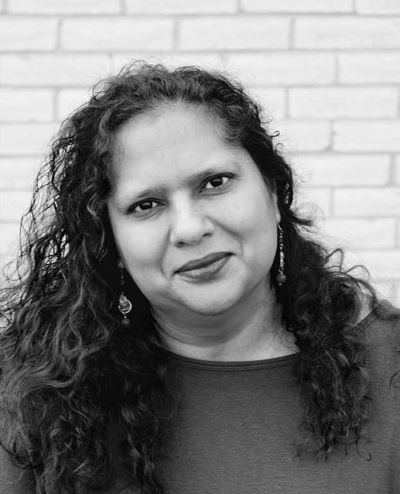
"I have trained in areas where I have found there is clinical need and have developed inter-collaborative models to support this work when it is not within midwifery scope – for example, the insertion of intra-uterine devices for contraception, medication abortion provision and management of early missed abortion. This work is not only necessary, but I see it as part of my commitment to community service as a midwife. There is a high need for this work in the communities I serve and few, if any, options for pregnant people who are without health insurance.
"I often think of my mother or grandmother as newly arrived immigrants to Canada and imagine what it would be like for them if they were in the same situation as my refugee clients. It fulfills me to feel like I am providing a much-needed service to people who are so often treated poorly or ignored in our health-care system. In addition, it is clinically challenging work, which is also fulfilling as I am always trying to serve needs better, get more training, have more collaboration in place to serve the communities better. The relief and gratitude I see in my clients’ eyes when they feel like they are being heard, or have somewhere trusting to go with their concerns, has been enough to keep me engaged for two decades now. In short - this work feeds my social justice activist soul."
Ola Levitin, RM (she/her)
Community Midwives of Ottawa [Ottawa]
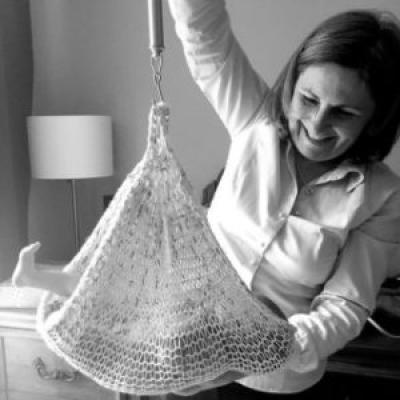
"Most refugee and non-insured clients come to Canada late in their pregnancy. Our clinic has a policy of leaving open spots every month for these clients. If they have no medical insurance, we are able provide blood work, ultrasounds and physician consultations covered through the midwifery program's non-insured funding.
"We recognize that transportation is usually an issue. We allocate practice funds to pay for bus tickets and uber. We also do a lot of home visits prenatally and postpartum. We solicit donations from the community to help fund this. We also solicit donations from the Ottawa community in the form of diapers, maternal and newborn clothing, bassinets, cribs, etc. We keep some donations in our clinic and the rest are found by word-of-mouth in the community. Our team of midwives dedicate their time to pick up and drop off donations. We use social media to facilitate this.
"The Ottawa community has come to know that our clients would benefit and offer generously. Last year, we had an $800 donation, which allowed us to buy [drugstore and grocery] gift cards for clients in need.
"Our practice is proud to provide culturally appropriate care in Mandarin, Russian and French. We strive to recruit midwives who speak languages other than English for our team. This June, because I speak Russian, I was able to offer our free spots to Ukrainians fleeing the war. I immigrated to Ottawa from Kyiv, Ukraine, as a refugee, in 1980 and this war is just devastating. I really needed to help. Pregnant people found me through an Ottawa Facebook group and reached out privately while still waiting for their travel documents in Ukraine or Poland. Some people were going to other provinces and I was able to find them midwifery care there through my contacts. The clients I could not accommodate with our practice still had a 'soft landing.' I met with them, explained how the Ontario system works for birth and found them either a midwife at another midwifery practice, an obstetrician or a family doctor who does obstetrics. We collected extra donations in anticipation of their arrivals to distribute. We are waiting for our first Ukrainian-Canadian baby to be born soon!
"I find it so fulfilling to give people the gift of safety. There is always a small element of mistrust when I meet them for the first time – ‘where's the catch?’ And then I watch people relax, as they recognize my genuine desire to help them have a safe birth, to give them a sense of control of their experience, to help them navigate our medical system."
Navjot Lidder, RM
Black Creek Community Health Centre [North York]
"Refugee clients constitute a very special and vulnerable group for health-care services. Health care has to be delivered simultaneously along with social and welfare services for it to be optimally effective and sometimes even have an uptake with these clients. Many of these clients present to our centre after having travelled through several different countries, after fleeing their own countries because of hostile environments. So we have a level of preparedness to cater to every possible basic need that we can comprehend.
"The midwifery program at BCCHC provides prenatal, postpartum, well baby and well person care to these clients, providing them with prenatal education in one-on-one sessions through interpreters in their own language; providing orientation to health-care system, how to access routine care and emergency care in the GTA [Greater Toronto Area].
"Sometimes I have clients come to me for prenatal care but actually they first request basic services and after that they let me start prenatal care. Sometimes they have a hard time expressing themselves due to language and cultural barriers or fear. So patiently listening to them and understanding their needs without being judgmental.
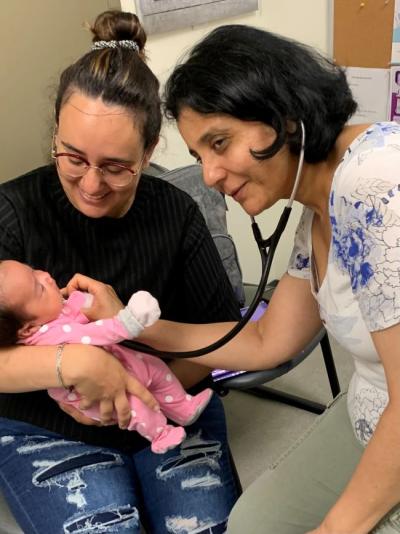
"Midwifery care is provided in co-ordination with other services covering the basic needs of these clients, including but not limited to:
- on-site snack packs and food trays for people who may not have eaten in a few days
- clothing for babies and basic clothing for adults to help with if needed
- bus tokens for transportation to appointments
- help connecting with other resources in community
- support with filling out paperwork and submitting applications for various reasons, example birth registration for babies
- advocacy work (we once had to advocate with an employer to facilitate a ROE for a woman to get maternity benefits)
- housing applications, or finding place to live
- connecting them to legal aid if needed
- a team of expert counsellors on site to support with mental health and trauma counselling services
"Services are provided in the client’s language through interpretation services. Our organization has a very multicultural team, and efforts are made to ensure clients feel respected and valued as members of the community.
"It is such a joy to see these clients evolve through the course of care. Starting from a place, where they are fearful and intimidated by so many challenges that they have faced, at the end of the course of care they are so happy and confidant to start a new life. Many of them ask me, ‘How do I become a midwife in Canada? I would like to do what you are doing!’ They experience the value associated with the service. This is very satisfying and reassuring feedback to me and in turn empowers me to give my best and keep evolving as a professional."
Shezeen Suleman (she, her)
MATCH Program, South Riverdale CHC [Toronto]
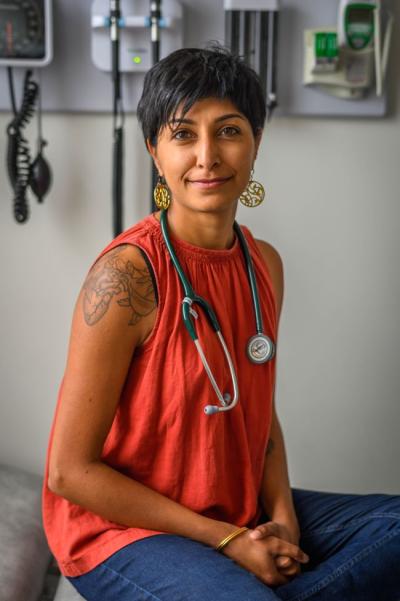
"I have a long history of working with migrants living in the city. Before midwifery, I worked in community work for a number of years, mainly with immigrant youth and their families. These experiences, together with my work in health care as a midwife, have helped me to see that what is considered routine care here in Ontario often excludes the health care needs of many, including migrant communities. My team at MATCH and I work to challenge these norms to provide the best health care possible to our clients.
"As an example, we reviewed the evidence around expanded Hepatitis B testing in pregnancy (beyond Hep B surface antigen testing) and found that, when tested, many of our refugee and immigrant clients had waning or no immunity to this vaccine-preventable illness. We have moved to bridging this gap by testing and offering vaccines to adults we care for who would be considered at risk.
"We then also examined the evidence around Hep B vaccines for newborns. We now include an informed choice discussion for all our clients recommending vaccine access starting a birth. Working with the communities that we do, including refugee clients, has helped to see where the gaps lie in routine care and have challenged us to re-examine them.
"In regards to broader access to care, my team and I work within a CHC. When clients are rostered to our team, they have access to all the services offered at the CHC including – for example, physiotherapy, dietetician services and social work – to round out their experience of health care. We also really focus on connecting our clients to primary care, which can be incredibly impactful to the refugee clients we serve who may have had disjointed access to care prior.
"Making home in a whole new land, leaving behind what you once knew forcibly or otherwise, can be a very complicated process. As I've seen in my clients and in my own family members, settling here in Canada requires tenacity, resourcefulness and, for some, constant code switching. I am in awe of the refugee and migrant clients that I serve; I may be providing perinatal care but I'm also learning so much from them every time."
